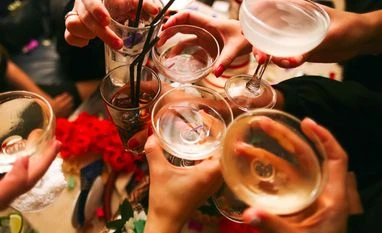This is Centre’s second attempt at imposing the GST on ENA, which is taxed by states at present. Alcohol for human consumption, or potable alcohol, is out of the GST, whereas its input, ENA, is a grey area. Industrial alcohol is within the GST.
“The council will take a re-look at taxing ENA under the GST. States had opposed it earlier, but now we have a legal view on the matter, strengthening our case for taxing it under the GST,” said a government official.
The council is meeting after a gap of one-and-a-half months.
The Centre has taken the views of the additional solicitor-general, who has pointed out that ENA is liable to the GST as it is not potable alcohol. The proposal is to tax it at the 18 per cent GST rate.
West Bengal Finance Minister Amit Mitra has argued if ENA is taxed under the GST, it will be seen as taxing alcohol. States currently levy a value-added tax (VAT) and sales tax on ENA.
“The council will also discuss if a constitutional amendment is needed to levy the GST on ENA or whether it can be done administratively,” said another official.
ENA is a derivative of molasses and 80 per cent of it goes into manufacturing liquor. The rest is used by the pharmaceutical industry to manufacture cough syrups and the cosmetics industry to make perfumes.
The pharmaceutical industry, in particular, has been demanding inclusion of ENA in the GST so that it can avail input tax credit.
The states have argued that if ENA is taxed under the GST, they will not be able to monitor the production of alcohol.
However, the inclusion of ENA in the GST may trigger the inclusion of potable alcohol as well.
“Inclusion of ENA will mean there will be a violation of the GST fundamentals. It will lead to a cascading of taxes. Ideally, input and output should face the same tax,” said an industry expert.
“One of the key objectives of the GST is to prevent breakage of the tax credit chain. This has not been achieved in the case of some inputs such as ENA. It is essential to evolve a system whereby input tax credit does not become a cost to any industry,” said MS Mani, partner, Deloitte India.
"If ENA is the sed as an input for production of alcohol and not fit for direct human consumption, then it should have been liable to GST right from beginning, as constitutional restriction with respect to levy of GST is only on alcoholic liquor for human consumption," said Pratik Jain, partner, PwC India.
The VAT paid on the purchase of ENA can be used as a set-off on the VAT payable on sale of potable alcohol.
However, if ENA is subject to the GST, input tax credit will no longer be available.
Sobering Reality
- GST Council to consider levying the tax on extra-neutral alcohol
- A derivative of sugarcane molasses, 80 per cent of high-purity ethyl alcohol or Surfin is used to manufacture 'alcohol for human consumption'; rest used in pharmaceutical, perfumery and cosmetic applications
- Potable alcohol is constitutionally outside the purview of GST
- States want to continue levying the value-added tax on ENACentre says it is not consumed by humans. Hence, GST must be levied
To read the full story, Subscribe Now at just Rs 249 a month
Already a subscriber? Log in
Subscribe To BS Premium
₹249
Renews automatically
₹1699₹1999
Opt for auto renewal and save Rs. 300 Renews automatically
₹1999
What you get on BS Premium?
-
Unlock 30+ premium stories daily hand-picked by our editors, across devices on browser and app.
-
Pick your 5 favourite companies, get a daily email with all news updates on them.
Full access to our intuitive epaper - clip, save, share articles from any device; newspaper archives from 2006.
Preferential invites to Business Standard events.
Curated newsletters on markets, personal finance, policy & politics, start-ups, technology, and more.
Need More Information - write to us at assist@bsmail.in
)